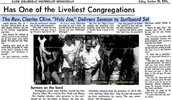Occasionally I have zealous friends/acquaintances state that we ought to go to national monuments/the Alamo/busy intersections/busy Wal-Marts during Black Friday/public beaches and stand up and preach the Gospel.
When I respond that it is not an appropriate setting, the usual response is that anywhere there are unbelievers is an appropriate setting.
I then usually respond that people are trying to shop/get to work/relax with their families and do not want to be disturbed and that Christianity ought to foster politeness and not rudeness. They usually charge me with not being evangelistic or caring for the souls of men. Or something like this...
Any better ways of answering that I could give these people?
When I respond that it is not an appropriate setting, the usual response is that anywhere there are unbelievers is an appropriate setting.
I then usually respond that people are trying to shop/get to work/relax with their families and do not want to be disturbed and that Christianity ought to foster politeness and not rudeness. They usually charge me with not being evangelistic or caring for the souls of men. Or something like this...
believe me you read the scriptures the Prophets preached in what many would say is the inappropriate setting they were stoned and all kinds of stuff. God told them to do certain stuff to cause a scene
Any better ways of answering that I could give these people?



 x1000
x1000